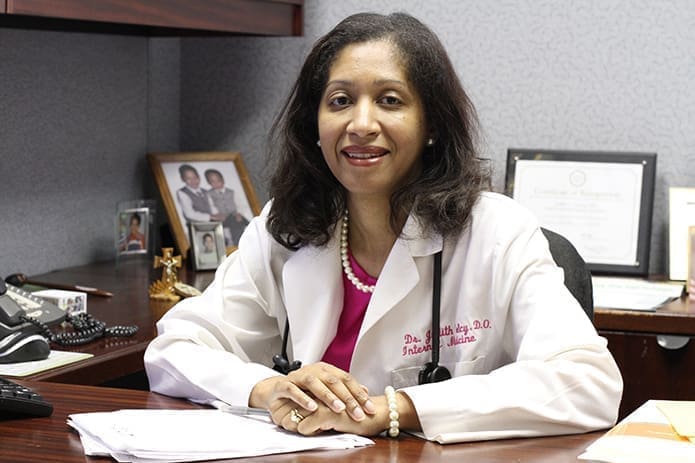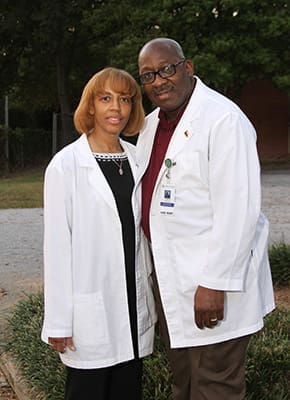 Photo By Michael Alexander
Photo By Michael AlexanderAtlanta
Mass recognizes life-saving work of those in health care
By ANDREW NELSON, Staff Writer | Published October 10, 2013
ATLANTA—The Atlanta Archdiocese is honoring Catholic physicians, nurses and other health care workers with the White Mass, signifying the white coat worn in the medical profession.
Archbishop Wilton D. Gregory and the priests of the archdiocese will celebrate the Mass in recognition of the profession’s life-saving work. The Mass is associated with St. Luke, the patron of physicians and surgeons, whose feast day is Oct. 18.
Dr. Judy Volcy says a prayer daily before she starts seeing patients.
“Lord, help me make the right decision, help me help the patients,” she said. “I hope the Holy Spirit will help me do the best that I can,” she said, taking a break from seeing patients at her Marietta office.
Her family encouraged Volcy to pursue medicine. She earned her degree in biology and psychology at Rutgers University in New Jersey, but in her senior year remained unsure of her future.
“It was actually a suggestion from my mother, who was a nurse. I honestly didn’t see it,” she said.
She attended New York College of Osteopathic Medicine. She did her medical internship at St. Michael Medical Center, Newark, N.J., and her residency at Grady Hospital here. For five years, she taught as an assistant professor at Morehouse School of Medicine before joining WellStar Health System.
Many of her patients come to see her with chronic illnesses, from heart disease to cancer. She said her faith and her work show how finite life is.
“People have different crosses to bear,” she said.
A person who has done everything right still gets a life-changing diagnosis, she said.
“It’s not guaranteed,” she said about good health and a long life.
A Jerusalem cross is visible in her office. It’s a gift brought back from the Holy Land. It can often be a conversation starter. And depending on patients, she may suggest prayer if she knows people come from a faith-based background.
Prayer is important for the 43-year-old, a member of St. Anthony of Padua Church, Atlanta. “I need the strength, the reinforcement, to guide me and stay focused on the task at hand.”
She likes to give back to the community, sharing her medical knowledge. She’s spoken on women’s health, such as on breast cancer. After natural disasters, Volcy supports the recovery efforts with her time, assisting Hurricane Katrina evacuees with their health needs, and following the Haiti earthquake she spent time with Children’s Healthcare of Atlanta to help with evacuees sent for medical care.
“Volunteering feels good, helping others in the way I know best—giving medical care,” she said.

Dr. Kim Jelks, left, is a commissioned officer with the U.S. Public Health Service. Her husband Levi, right, is a permanent deacon and a registered nurse who works as cardiac case manager at Southern Regional Medical Center, Riverdale. He is also enrolled in a Family Nurse Practitioner Program, which he is scheduled to complete in 2014. Photo By Michael Alexander
Medicine is a way of service for Dr. Kim Jelks and her husband, Deacon Levi Jelks.
Jelks is a commissioned officer with the U.S. Public Health Service, which treats “the poorest of the poor.” She is assigned as an administrator with the federal Health Resources and Services Administration, the primary federal agency for improving access to health care for people who are uninsured, isolated or medically vulnerable. She is also a member of the health service’s rapid deployment team, being flown in on a moment’s notice to treat victims of natural disasters, including Hurricane Sandy last year.
She was inspired by the example of her mother, a nurse, and her father, a doctor, in Philadelphia. They were always treating people who could never pay, she said. “I don’t consider it work. I consider it my life’s mission.”
Her husband shares her passion. A longtime registered nurse, he is also a deacon, serving at St. Anthony of Padua.
“I live my life as a nurse and Catholic deacon by placing God first in my work and in constant prayer at work. Nursing can truly be seen as an opportunity to do works of mercy. As a deacon and nurse, they can go hand in hand in being a servant to our brothers and sisters,” he said.
He is now a cardiac case manager at Southern Regional Medical Center, Riverdale. He’s also worked in the emergency room as the charge nurse and as a hospice nurse at Our Lady of Perpetual Help Cancer Home in Atlanta. He became Catholic as an adult after “witnessing the good works from the nuns” and entered the church through the Rite of Christian Initiation for Adults. The cancer home is sponsored by the Hawthorne Dominicans.
Deacon Jelks has baptized infants in hospitals, in addition to bringing Communion to patients and families. In his experience, he’s witnessed death with hope-filled families at hospice, but also seen “hope is lost in many families” when loved ones die unexpectedly.
“I’m always engaged in praying for patients and family members,” he said.
Dr. Jelks said she sees her faith life as “intricately involved” with being a physician.
“I call on the Holy Spirit to guide me in whatever I do. It becomes almost second nature,” she said. Her personal email is “spiritualMD.”
Medicine works from science, she said. “But it isn’t an exact science,” she said, so it is important to treat the whole person. If a person of faith finds hope in prayer that can be part of treatment, she said.
“We cannot always fix everything with medicine. There are sometimes things that go beyond our human scope,” she said.